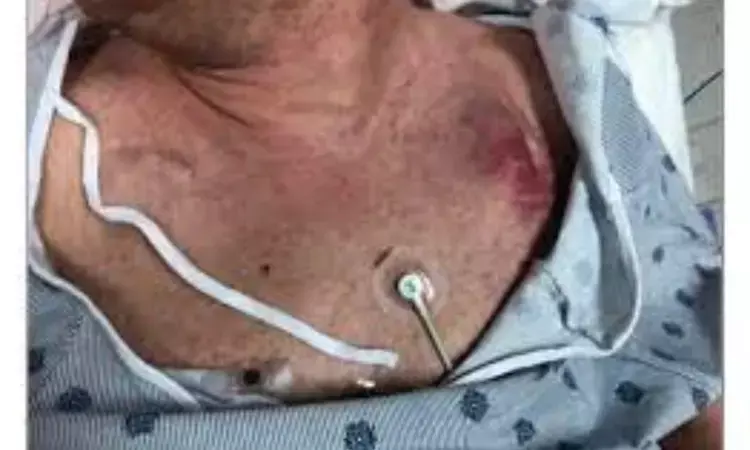- Home
- Medical news & Guidelines
- Anesthesiology
- Cardiology and CTVS
- Critical Care
- Dentistry
- Dermatology
- Diabetes and Endocrinology
- ENT
- Gastroenterology
- Medicine
- Nephrology
- Neurology
- Obstretics-Gynaecology
- Oncology
- Ophthalmology
- Orthopaedics
- Pediatrics-Neonatology
- Psychiatry
- Pulmonology
- Radiology
- Surgery
- Urology
- Laboratory Medicine
- Diet
- Nursing
- Paramedical
- Physiotherapy
- Health news
- Fact Check
- Bone Health Fact Check
- Brain Health Fact Check
- Cancer Related Fact Check
- Child Care Fact Check
- Dental and oral health fact check
- Diabetes and metabolic health fact check
- Diet and Nutrition Fact Check
- Eye and ENT Care Fact Check
- Fitness fact check
- Gut health fact check
- Heart health fact check
- Kidney health fact check
- Medical education fact check
- Men's health fact check
- Respiratory fact check
- Skin and hair care fact check
- Vaccine and Immunization fact check
- Women's health fact check
- AYUSH
- State News
- Andaman and Nicobar Islands
- Andhra Pradesh
- Arunachal Pradesh
- Assam
- Bihar
- Chandigarh
- Chattisgarh
- Dadra and Nagar Haveli
- Daman and Diu
- Delhi
- Goa
- Gujarat
- Haryana
- Himachal Pradesh
- Jammu & Kashmir
- Jharkhand
- Karnataka
- Kerala
- Ladakh
- Lakshadweep
- Madhya Pradesh
- Maharashtra
- Manipur
- Meghalaya
- Mizoram
- Nagaland
- Odisha
- Puducherry
- Punjab
- Rajasthan
- Sikkim
- Tamil Nadu
- Telangana
- Tripura
- Uttar Pradesh
- Uttrakhand
- West Bengal
- Medical Education
- Industry
Absence of typical symptoms and delayed culture results tied to misdiagnosis of cutibacterium acnes endocarditis: JAMA

Netherlands: A recent study published in JAMA Network Open has suggested a difficult diagnosis of Cutibacterium acnes endocarditis because of the absence of typical endocarditis features.
Therefore, Floris J. Heinen, Department of Cardiology, Haga Hospital, Den Haag, the Netherlands, and colleagues recommend extending blood culturing for male patients with new-onset prosthetic valve dysfunction, signs of heart failure, or peripheral embolization.
In the case series involving 105 patients, C acnes endocarditis was predominantly observed among male patients with prosthetic heart valves and was characterized by the absence of fever, close to normal inflammatory markers, and a prolonged time to positive blood culture results. A high proportion of patients required surgical treatment.
Cutibacterium acnes is a gram-positive bacteria known for its role in acne vulgaris. Generally, C acnes are considered nonpathogenic, and positive blood culture results are often taken as contaminated. In recent years, there has been increased attention towards C acnes as a cause of infective endocarditis (IE).
Experienced clinicians hypothesize that patients with C acnes endocarditis have a difficult diagnosis because typical IE features, such as high levels of inflammatory markers and fever are often absent. However, only case reports or small case series have supported these statements. Therefore, the research team aimed to evaluate the clinical characteristics and outcomes of patients with C acnes endocarditis in a large cohort of more than 100 patients.
The researchers performed a case series of 105 patients presenting to seven hospitals in France and the Netherlands with definite endocarditis according to the modified Duke criteria between 2010 to 2020. Retrieval of clinical characteristics and outcomes was done from medical records. Cases were identified by valve or blood and prosthesis cultures positive for C acnes, retrieved from the medical microbiology databases.
The study's main outcomes were the presence of prosthetic valve endocarditis, symptoms at presentation, time to positive results of blood cultures, laboratory test results at presentation, 30-day and 1-year mortality rates, endocarditis relapse rates, and treatment type (surgical or conservative).
The study led to the following findings:
- 105 patients (mean age, 61.1 years; 91.4% were men; 88.6% with prosthetic valve endocarditis) were identified and included.
- 66.7% of patients did not experience a fever before hospital admission, nor was it present at hospitalization.
- The median C-reactive protein level was 3.6 mg/dL (IQR, 1.2-7.5 mg/dL), and the median leukocyte count was 10.0 × 103/µL (IQR, 8.2-12.2 × 103/µL).
- The median time for positive blood culture results was 7 days.
- Surgery or reoperation was indicated for 88 patients and performed for 80 patients.
- Not performing the indicated surgical procedure was associated with high mortality rates.
- Seventeen patients were treated conservatively, under the European Society of Cardiology guideline; these patients showed relatively high rates of endocarditis recurrence (29.4%).
"This case series indicates the predominant presence of C acnes endocarditis among male patients with prosthetic heart valves. C acnes endocarditis diagnosis is difficult due to its atypical presentation, with the frequent absence of inflammatory markers and fever," the researchers wrote. "Diagnostic process may be further delayed by the prolonged time to positivity of blood culture."
The team added, "Not performing a surgical procedure when indicated may be linked with higher mortality rates."
"For prosthetic valve endocarditis with small vegetations, there should be a low threshold for surgery because this group seems prone to endocarditis recurrence," they concluded.
Reference:
Heinen FJ, Arregle F, van den Brink FS, et al. Clinical Characteristics and Outcomes of Patients With Cutibacterium acnes Endocarditis. JAMA Netw Open. 2023;6(7):e2323112. doi:10.1001/jamanetworkopen.2023.23112
Dr Kamal Kant Kohli-MBBS, DTCD- a chest specialist with more than 30 years of practice and a flair for writing clinical articles, Dr Kamal Kant Kohli joined Medical Dialogues as a Chief Editor of Medical News. Besides writing articles, as an editor, he proofreads and verifies all the medical content published on Medical Dialogues including those coming from journals, studies,medical conferences,guidelines etc. Email: drkohli@medicaldialogues.in. Contact no. 011-43720751


